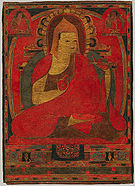- Manava (king)
-
Kingdom of Gauda 600–626 Capital Karnasuvarna Religion Hinduism, Buddhism Government Monarchy King - 600-625 Shashanka - 625-626 Manava History - Established 600 - Disestablished 626 Part of a series on the History of Bengal 
Ancient Bengal Vedic Period Ancient Bengali States
Gangaridai Kingdom, Vanga Kingdom,
Pundra Kingdom, Suhma Kingdom,
Anga Kingdom, Harikela KingdomMauryan Period Classical Bengal The Classical Age Shashanka Age of Empires
Pala Empire, Sena EmpireMedieval Bengal Arrival of Islam
Sultanate of Bengal, Deva Kingdom
Bakhtiyar Khilji, Raja GaneshaMughal Period
Pratap Aditya, Raja Sitaram Ray
Nawab of Bengal, Baro-BhuyansModern Bengal Company Raj
Zamindari system, Bengal famine of 1770British Indian Empire
Bengal Renaissance
Brahmo Samaj
Swami Vivekananda, Jagadish Chandra Bose,
Rabindranath Tagore, Subhash Chandra BosePost-Colonial
1947 Partition of Bengal, Bangladesh Liberation War
Sheikh Mujibur Rahman, Jyoti BasuSee Also Bangladesh, West Bengal Manava was the son and successor to the king of Gauda, Shashanka. He was the last recorded ruler of the dynasty and was likely deposed by Harshavardhana (Emperor of Northern India) or Bhaskaravarman (King of Kamarupa). He ruled as king for 8 months.
See also
References
Prasad Sinha, Bindeshwari (1977). Dynastic History of Magadha. New Delhi: Abhinav Publications. pp. 133.
Categories:- Former monarchies of Asia
- Former countries in Asia
- States and territories established in 600
- States and territories disestablished in 626
- Rulers of Bengal
- History of Bangladesh
- History of Bengal
- People in the history of India
- 7th-century monarchs in Asia
- Royalty stubs
Wikimedia Foundation. 2010.
